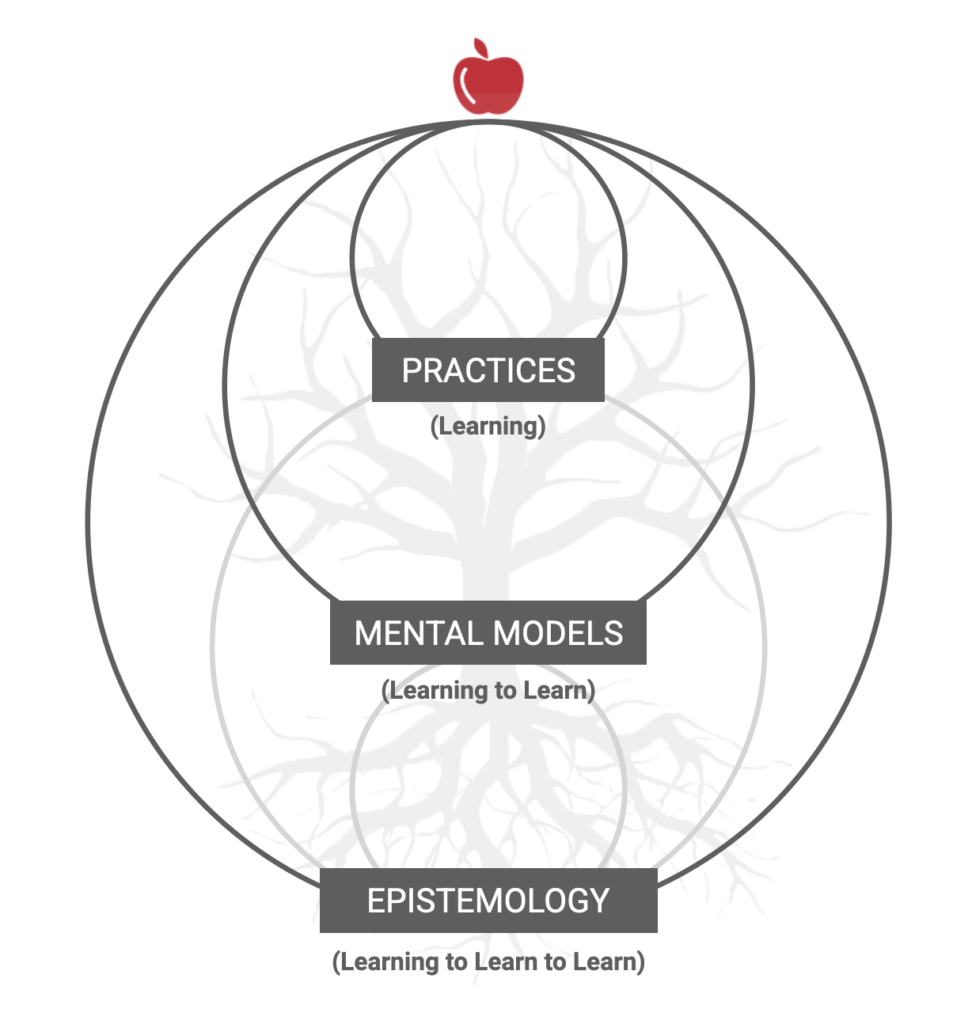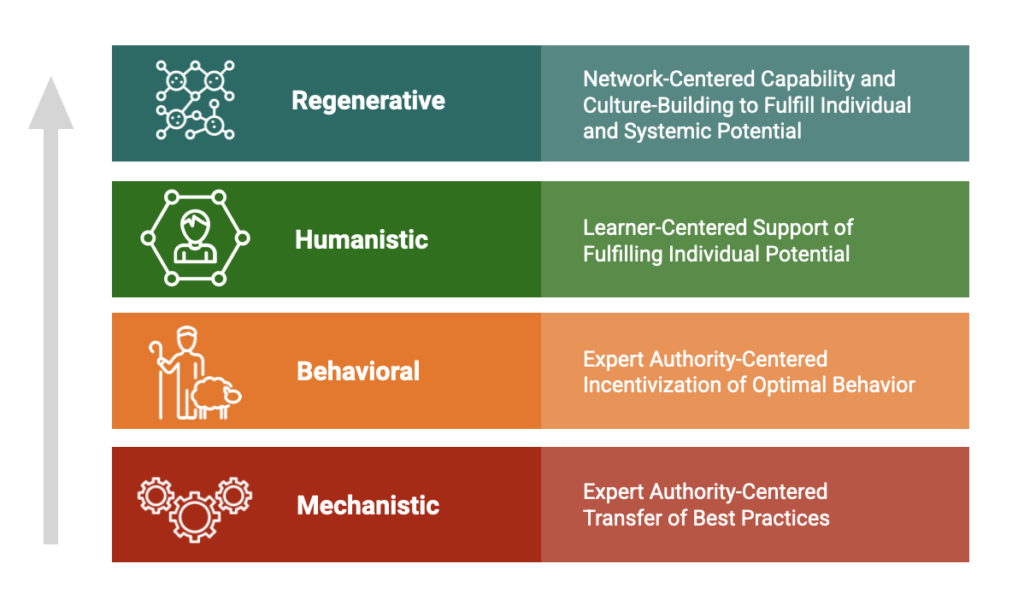L&D Must Go Deeper: Shifting Epistemology

When it comes to performance in the modern workplace, to a greater and greater degree what is needed now is not a new set of best practices, but rather a paradigm shift that changes how we think about and approach learning itself. The reason is simple: as we face more and more uncertainty in the face of rapid change, it’s often not clear exactly what needs to be done, how it needs to be done, or by whom.
Here we’ll introduce a couple of simple frameworks that will help guide us in working through this. Our suggestion is that you think of these frameworks as an invitation to look at things through a specific lens, rather than a declaration of something objectively true. The first framework is the Tree of Increasingly Delicious Fruit, which draws from Gregory Bateson’s Levels of Learning, Chris Agyris’ and Donald Shon’s Double Loop Learning, and a number of researchers who have explored Triple Loop Learning.

The fruit at the top of the tree represents the value we create for others—the outcome or result of our performance, the fruit of our labors. Each level, or loop, represents a key part of the process of developing this outcome. We can use this to frame our view of how to support the development of our capacity for creating value.
On the first level are the branches of the tree which represent current practices. Learning on this level is about developing new practices or behaviors. Supporting learning on this level is typically focused on transferring knowledge in the form of best practices. The vast majority of current L&D initiatives are largely focused here.
On the second level is the trunk of the tree, representing our core thinking patterns or mental models which guide the process of making decisions about which practices to implement. Learning on this level is about changing these patterns and developing our thinking, or reshaping our core assumptions and beliefs. Supporting learning on this level involves promoting self-reflection on one’s own process of making decisions. In doing so, we are helping our learners learn to learn.
On the third level are the roots, representing our epistemology or our embodied understanding of what learning is and how it happens. This understanding informs the process by which we develop our mental models and therefore our behavior. Gregory Bateson described learning on this level as learning to learn to learn. Here we are evolving how we embody the learning process itself. Arguably, this level of learning is best supported by giving learners the experience of a new way of learning. This experience must disrupt the learner’s current learning habits, informed by the dominant epistemological paradigm they are operating from.
This point cannot be understated and is challenging to wrap our heads around for a very specific reason: it requires more than just our heads. We may change our mental models about new ways of learning, for example, without changing the underlying epistemology. Arguably, epistemology is embodied and is closely linked to ontology – or or level of being. In other words, it is deeper than a new set of ideas and it changes through transformative experience. With this in mind we can consider the limitation, then, of an article written on the subject. It may plant some seeds but there is important work to be done between now and the harvest.
As the context of our work changes, we are challenged to dig down deeper to develop both new ways of thinking and new ways of learning. This challenge extends well beyond L&D to all of our current and potential stakeholders. Yet if we are to serve as effective resources in this critical developmental work, we must be willing to do this deeper work ourselves as learning professionals and as L&D teams.
We can begin this journey together by exploring our own epistemic roots, examining how we perceive the learning process and how we may deepen our understanding of it. How do we think about learning? Where do our current views come from? In what ways do they need to evolve to be more effective in our current and future roles as the world changes around us?
Our view of learning is a fundamental part of our personal philosophical views. To help us reflect and develop these views, we’ll present another simple framework which outlines a few major worldview paradigms. We’ll then briefly summarize each paradigm to help us better assess our own views and reflect on how we can develop them. This can also help us better understand the current views of our stakeholders so we may support them more strategically in developing them.

From the Mechanistic paradigm, organizations are seen as machines that are kept running by experts who can diagnose problems and provide clear solutions. Learning is expert-centered and focused on identifying and disseminating best practices in a process of knowledge transfer from expert to learner.
From the Behavioral paradigm, our focus expands to manipulating and incentivizing target behavior to hit a desired target. As with the Mechanistic paradigm, the aim is control and predictable performance guided by authority figures with clarity on what people need to do and how. These first two paradigms often blend together, with a combination of SME-driven transfer of best practices and incentives in the form of rewards or punishments.
From the Humanistic paradigm, the focus shifts to empowering individuals to fulfill their inherent potential. There is often some attempt to flatten traditional hierarchical structures. Learning is learner-centered and there is an increased emphasis on personalization, creating “safe spaces,” as well as working toward shared ideals such as diversity, equality, equity and inclusion.
From the Regenerative paradigm, our focus shifts to seeing learning in terms of co-evolving, whole living systems. The focus on realizing individual potential is transcended and included to also focus on realizing the potential of our teams, families, organizations, communities, and ecosystems as wholes nested within greater wholes. Learning is network-centered and L&D is aimed at strategically developing the capacity of systems to continuously co-evolve, informed by principles derived from the study of complex living systems.
Each of these paradigms represents a different epistemology as well as pedagogy. In other words, each informs a different philosophy of learning and supporting the learning process.
The urgent challenge we are facing today is that we are still largely trapped in epistemologies that center around expert authorities having clear answers. As we face greater and and greater degrees of uncertainty about the best path forward, we will need to not only develop new ideas about learning, but new levels of embodied understanding about how we are evolving together as whole living systems: as individuals, teams, families, organizations, communities, industries, fields, markets, supply chains, ecosystems, and so on.
Receive New Posts in Your Inbox
No Spam, Unsubscribe Anytime
Founder and CEO at The Continuous Learning Company
Tom helps L&D teams create more strategic value by developing capabilities and cultures of continuous learning.
Latest posts by Tom Palmer (see all)
- Beyond Growth Mindset: Building Coevolutionary Capacity - April 20, 2023
- 7 Principles of Regenerative Learning & Development - March 15, 2023
- L&D Must Go Deeper: Shifting Epistemology - January 16, 2023
